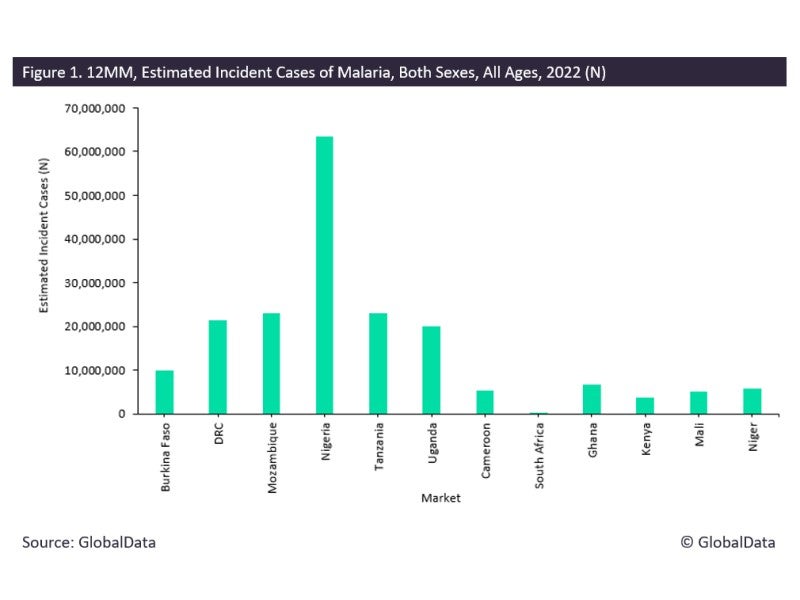Malaria is a vector-borne disease caused by parasites of the genus Plasmodium. Malaria is transmitted through the bite of the female Anopheles mosquito. When a human is infected with the disease, they commonly present with a high-grade intermittent fever, headaches, chills and fatigue. Severe infections can result in death. The transmission of malaria can be prevented using insecticide-treated bed nets, indoor residual spray and antimalarial drugs. In October 2021, the World Health Organization (WHO) endorsed the first malaria vaccine. Although the efficacy of the malaria vaccine is only 40%, the vaccine will likely be most successful when used alongside other pre-existing malaria prevention methods and when there is wide vaccination coverage among affected populations. GlobalData epidemiologists expect that decreased vaccine hesitancy towards the Covid-19 vaccine will likely translate to decreased vaccine hesitancy towards the malaria vaccine, and estimated incident cases of malaria will likely decrease over the next ten years as malaria vaccine coverage increases across sub-Saharan African countries.
Slower than expected uptake of vaccines is a pressing public health challenge across sub-Saharan Africa. This has been particularly emphasised during the rollout of Covid-19 vaccinations. A recent cross-sectional analysis on the variation of intent to receive the Covid-19 vaccine was published in BMC Public Health by Burger and colleagues. The study compared longitudinal data from waves 4 and 5 of the National Income Dynamics Study: Coronavirus Rapid Mobile Survey, which was conducted during February – March 2021 and April – May 2021, respectively. A total of 5,629 South African adults participated in wave 4 of the study, and 5,862 adults participated in wave 5. The interviews that took place in wave 5 overlapped with the large-scale vaccine rollout to healthcare workers across South Africa. Burger and colleagues expected that the positive experiences of Covid-19 vaccinations would prompt vaccine recipients to encourage friends and family members to also receive the vaccine. The results showed that 76.1% of participants in wave 5 agreed that they would receive the vaccine if it was available to them. This was a statistically significant increase from the 70.8% of participants who said the same in wave 4. This suggests that as more people receive a vaccine successfully, without suffering from complications, vaccine uptake is likely to increase. As such, it is vital that malaria vaccination campaigns are implemented among populations with a high malaria burden, with the hope that once initial vaccinations have been successfully administered, there will be reduced vaccine hesitancy within these vulnerable populations.
According to GlobalData epidemiologists, there were approximately 186,318,000 estimated incident cases of malaria across the 12 major African markets (12MM) (Burkina Faso, Cameroon, the Democratic Republic of Congo [DRC], Ghana, Kenya, Mali, Mozambique, Niger, Nigeria, South Africa, Tanzania and Uganda) in 2022 (as shown in Figure 1). This is expected to increase to 211,098,000 estimated incident cases in 2027. However, if Covid-19 vaccination rollout and campaigns can reduce vaccine scepticism, GlobalData epidemiologists expect that the estimated incident cases of malaria will be lower than the current forecast estimates over the next ten years, as the public awareness of the importance of vaccination increases, and more people subsequently engage with vaccination programmes, resulting in fewer people being vulnerable to infection.
The WHO and Gavi, the Vaccine Alliance (GAVI) have launched Covid-19 vaccination campaigns that aim to educate the public on vaccine safety and the importance of vaccination. Engagement with Covid-19 vaccination campaigns, and the increasing word-of-mouth regarding positive, safe vaccination experiences, are hoped to reduce general vaccine scepticism across sub-Saharan Africa. This would be extremely beneficial in controlling the malaria epidemic, as increased vaccine uptake could reduce the burden of the disease across the region.

US Tariffs are shifting - will you react or anticipate?
Don’t let policy changes catch you off guard. Stay proactive with real-time data and expert analysis.
By GlobalData





